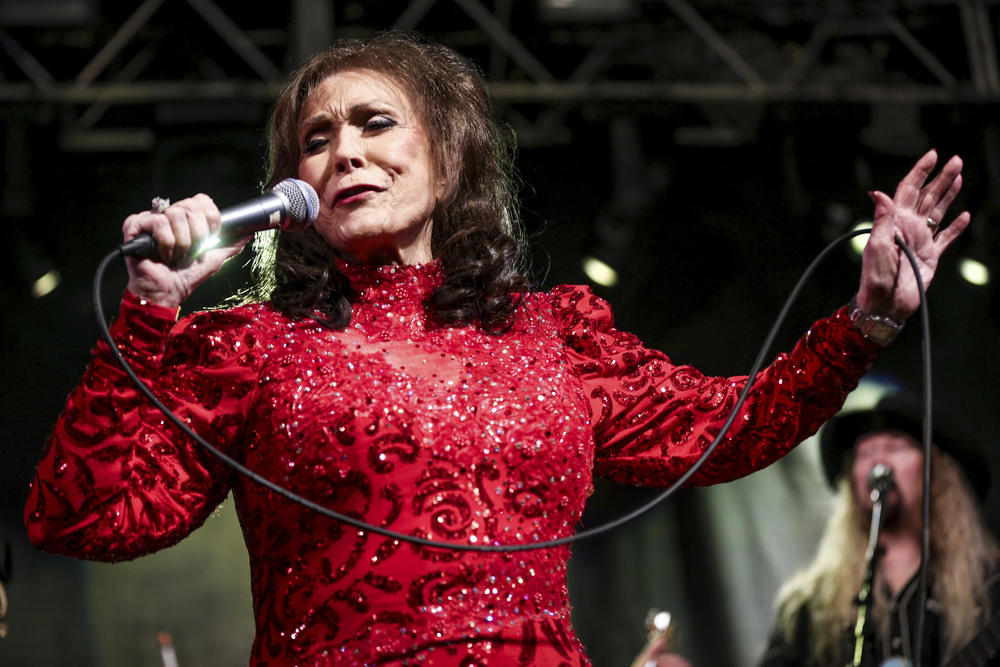
Caption
Loretta Lynn performs at the BBC Music Showcase during South By Southwest on March 17, 2016, in Austin, Texas.
Credit: Rich Fury/Invision/AP
One of country music’s greatest and most influential stars, Loretta Lynn, died this week at age 90. Her fearless and powerful writing spoke for rural people everywhere — particularly for rural women. Salvation South editor Chuck Reece has this remembrance.

Loretta Lynn performs at the BBC Music Showcase during South By Southwest on March 17, 2016, in Austin, Texas.
Chuck Reece - Salvation South Editor: When Loretta Lynn died this week. The headline in The New York Times read, Loretta Lynn, Country Music Star and Symbol of Rural Resilience Dies at 90. A symbol of rural resilience. I'd go further than that. I'd say that Loretta was the voice of rural people. I'd say that probably no songwriter ever captured the strong backbone and indomitable spirit of country folks, particularly country women, the way that Loretta Lynn did.
Her story is, of course, widely known.
[MUSIC]
Lorretta Lynn: Well, I was born a coal miner's daughter / In a cabin on a hill in Butcher Holler.
Chuck Reece - Salvation South Editor: Her music was hardcore country. But what made Loretta stand out from the pack were the hard-hitting lyrics of her songs. She spoke stridently for country women everywhere. She wrote without fear about the toughest issues women face: infidelity, divorce, pregnancy in a genre that was then dominated by men. In 1966’s, "You Ain't Woman Enough To Take My Man," she belted, “women like you, they're a dime a dozen. You can buy 'em anywhere."
[MUSIC]
Loretta Lynn: For you to get to him, I have to move over / And I'm gonna stand right here. / It'll be over my dead body / So get out while you can / 'Cause you ain't woman enough to take my man.
Chuck Reece - Salvation South Editor: In 1968's "Fist City" she sang, 'If you don't want to go to Fist City, you'd better detour around my town, 'cause I'll grab you by the hair of the head —"
[MUSIC]
Loretta Lynn: and lift you off the ground.
Chuck Reece - Salvation South Editor: When the sexual revolution came along, Loretta didn't shy away. She bought right in. In 1975, she recorded a song called "The Pill." Sixty radio stations banned it, but it became a top 10 hit anyway. She sang, 'This old maternity dress I've got is going in the garbage. The clothes I'm wearing from now on won't take up so much yardage, miniskirts, hot pants and a few little fancy frills."
[MUSIC]
Loretta Lynn: Yeah, I'm making up for all those years since I've got the pill.
Chuck Reece - Salvation South Editor: The only time I ever got to see Loretta perform was in New York City at a little 400-capacity nightclub called The Bottom Line. She came on stage, stately in one of the beautiful old-timey dresses that were her standard stage attire. Over the next 90 minutes, I watched her turn a crowd of Greenwich Village dilettantes into true believers. Her power was undeniable. She was a voice for country women everywhere and, really, for all of us folks who grew up overlooked in little rural towns. No one could ever replace her. Every new generation of women in country music reveres and emulates her. Her influence will live on and we will miss her forever.
Come visit us at Salvation South.
Salvation South editor Chuck Reece comments on Southern culture and values in a weekly segment that airs Fridays at 7:45 a.m. during Morning Edition and 4:44 p.m. during All Things Considered on GPB Radio. You can also find them here at GPB.org/Salvation-South and now on your favorite podcast platforms as well.